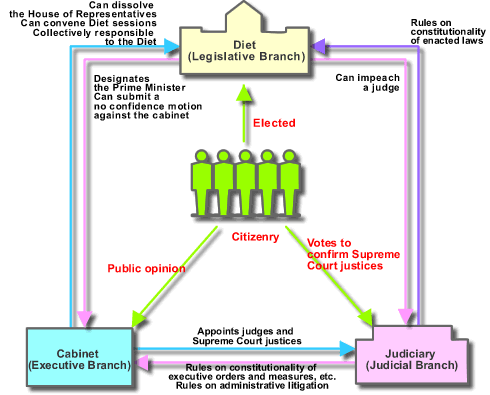Relationship to Other Bodies
Separation of Powers

The system of government in Japan features a three-way separation of powers --- giving legislative powers to the Diet, executive powers to the cabinet, and judicial powers to the judiciary. The aim of that system is to prevent any undue concentration of power through checks and balances, which in turn helps guarantee the rights and freedoms of ordinary citizens.
Relationship between the Diet and the Cabinet
The cabinet is collectively responsible to the Diet, and at least half of the cabinet ministers must be members of the Diet. The Diet chooses the prime minister from among its members. The House of Representatives has the right to submit and vote on a motion of no confidence against members of the cabinet, while the cabinet has the power to dissolve the House of Representatives.
Relationship between the Diet and the Judiciary
The judiciary has the power to determine the constitutionality of laws enacted by the Diet. The Diet has the power to initiate impeachment proceedings to remove a judge from the bench.
Relationship between the Diet and the Emperor
The emperor has no power regarding matters of national government. The convening of the Diet, promulgation of laws, dissolving of the lower house, and other such actions are carried out nominally by the emperor based on the advice and consent of the cabinet.
Relationship between the House of Councillors and the House of Representatives
The House of Councillors (upper house) and the House of Representatives (lower house) are independent of each other. The will of the Diet essentially consists of mutual agreement by the two houses. On matters of budget, treaties, and designation of the prime minister, the House of Representatives has ascendancy. That is, if the two bodies reach different decisions and those differences cannot be resolved at the inter-parliamentary conference committee level, the decision of the House of Representatives becomes the will of the Diet. Deliberations on the budget take place first in the House of Representatives.
